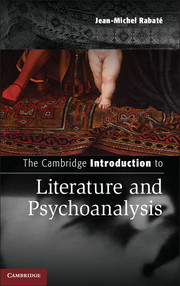Book contents
- Frontmatter
- Contents
- Acknowledgments
- Introduction
- Chapter 1 Freud’s theater of the unconscious
- Chapter 2 Literature and fantasy, toward a grammar of the subject
- Chapter 3 From the uncanny to the unhomely
- Chapter 4 Psychoanalysis and the paranoid critique of pure literature
- Chapter 5 The literary phallus, from Poe to Gide
- Chapter 6 A thing of beauty is a Freud forever
- Chapter 7 From the history of perversion to the trauma of history
- Conclusion
- Keywords and Index of Authors
- Bibliography
- Index
- References
Chapter 3 - From the uncanny to the unhomely
Published online by Cambridge University Press: 05 September 2014
- Frontmatter
- Contents
- Acknowledgments
- Introduction
- Chapter 1 Freud’s theater of the unconscious
- Chapter 2 Literature and fantasy, toward a grammar of the subject
- Chapter 3 From the uncanny to the unhomely
- Chapter 4 Psychoanalysis and the paranoid critique of pure literature
- Chapter 5 The literary phallus, from Poe to Gide
- Chapter 6 A thing of beauty is a Freud forever
- Chapter 7 From the history of perversion to the trauma of history
- Conclusion
- Keywords and Index of Authors
- Bibliography
- Index
- References
Summary
Beckett learned with Bion and Jung but kept paying homage to Freud, although he feared the reductive aspect of his theories. Like many sophisticated writers and readers, he tended to deride a certain naivety shown by Freud facing literature. Such naivety is nowhere more evident than when Freud wrote to the German novelist Wilhelm Jensen asking if Jensen had read The Interpretation of Dreams and if he had a sister, given the brother-sister incest theme in his novella Gradiva, a Pompeian Phantasy. Jensen replied politely that he had not read Freud and that he had no sister. I will now discuss Freud’s reading of Jensen’s charming novella, a literary or belletristic exercise completed to please Jung, who had first pointed it out to Freud.
Gradiva / Gravida
Freud’s book, Delusions and Dreams in Jensen’s Gradiva, evinces such a lightness of touch and ease in style that one recognizes a transferential element: this was his gift to Jung, who praised it warmly in return. Freud expressed some regret at Jensen’s lack of cooperation: “Soon after the publication of my analytic examination of Gradiva I attempted to interest the elderly author in these new tasks of psycho-analytic research. But he refused his co-operation.” In fact, Jensen had replied courteously to Freud when the latter had sent him the essay, but he insisted that the text had no foundation in his life or in science. It was just a fantasy. Jensen, who gave the telling subtitle of pompejanisches Phantasiestück to his novella, had the right to insist on his “free” and “autonomous” use of the imagination. Freud looks like a bully when in his 1912 postscript he looks for clues, repetition compulsion, and the recurrent image of a brother-sister link in Jensen’s fiction. Freud still believed that because Jensen saw “a sister in the woman he loves,” he penned the story.
- Type
- Chapter
- Information
- Publisher: Cambridge University PressPrint publication year: 2014
References
- 1
- Cited by

